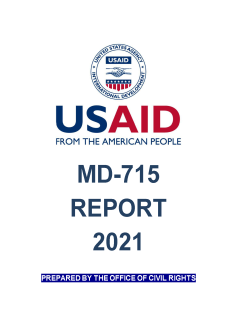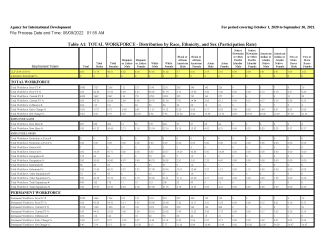The Office of Civil Rights and Diversity (OCRD) is an independent office in USAID. The Office supports the USAID mission to administer international development and humanitarian assistance by providing leadership, strategic direction, guidance, and technical assistance and advice to Agency leadership and management and educating the entire USAID workforce regarding the Agency’s EEO Program functions and their EEO rights and responsibilities.
OCRD organized an action team to create this MD-715 report, track progress toward planned activities, and analyze workforce data to identify and address triggers and barriers to employment. This approach involved convening critical stakeholders across the Agency to identify tangible actions that promote a more equitable workplace. Key stakeholders included OCRD, the Office of Human Capital and Talent Management (HCTM), and the Bureau for Policy, Planning, and Learning (PPL), as well as Employee Resource Groups (ERG), the American Federation of Government Employees (AFGE), the American Foreign Service Association (AFSA), and the Office of Employee and Labor Relations (E/LR). Using the results of the data analysis, the MD-715 action team examined USAID's policies, practices, and procedures while assessing the Agency's current efforts to identify and eliminate employment barriers.
The Self-Assessment Checklist reflects 156 compliance measures that make up the six essential elements of a Model EEO Program. However, only 154 standards are applicable to USAID; those are shown in the scorecard below. A corresponding recommendation in Part H includes planned remediation activities for each deficiency identified in Part G requiring additional explanation. In FY 2021, USAID met 89.61 percent (138) of the compliance measures as compared to 90.85 percent (139) measures in FY 2020.


